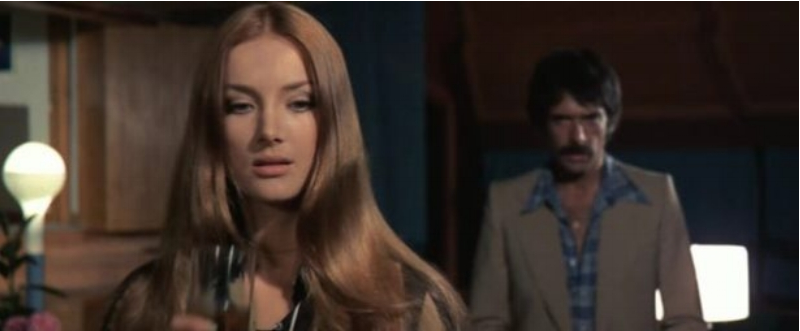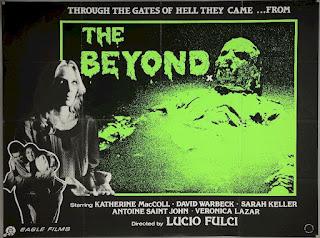(Lucio Fulci, Italy, 1972, 105 minutes)
By Tony Kay
Sometime in the mid-1960s, Hitchcockian suspense, pulpy whodunnits, psycho-sexual excess, and psychedelic splashiness converged in Italian popular cinema, giving birth to the movie sub-genre known as the giallo.
Then Dario Argento's The Bird with the Crystal Plumage hit theaters in 1970, and its colossal international success popularized the sub-genre. A rapid succession of likewise violent, sexually overheated, psychedelicized mysteries followed.
Gialli became so proliferate so fast that the movement quickly begat its own sets of tropes and clichés. So by the time director Lucio Fulci's Don't Torture a Duckling saw wide release in 1972, the unmistakable waft of formula was already setting in.
Fulci, a journeyman who'd previously helmed everything from broad comedies to spaghetti westerns, had already directed two successful gialli (1969's Perversion Story and 1971's Lizard in a Woman's Skin), but with Don't Torture a Duckling, he ferociously subverted the giallo rulebook.
In the process, he crafted what just might be his best movie, and one of the sub-genre's finest efforts. Duckling makes its domestic debut as a hi-def 4K on Arrow Video this week, and the added audio-visual punch renders this unremittingly dark jewel of a film all the more impactful.
The subversion of cliché in Fulci's third giallo literally commences from the first frame. Most movies in the cycle take place in bustling, quintessentially urban settings: Duckling begins with a slow pan across a large, remote-feeling valley that houses Accendura, the movie's rural Italian village setting.
A small concrete ribbon of highway threads through the placid surroundings, and all's silent, save one young shepherd boy's plaintive singing. At first blush, things appear positively idyllic.
But seconds later, DoP Sergio D'Offizi’s camera settles on a patch of earth, as two hands begin clawing at the soil, unearthing what looks like a baby's skeleton. Riz Ortolani's musical score erupts into menacing staccato stings at the reveal. The hands belong to Maciara (Florinda Bolkan), the town witch, and we're immediately escorted into a world that conceals a hotbed of human ugliness beneath the most lullingly comforting of surfaces.
The imperfect reality beneath Accendura's scenic exterior continues to surface during Duckling's opening moments. Fulci follows some of the village's seemingly innocent kids as they engage in decidedly non-innocent behavior: One child gleefully imperils a harmless lizard with his slingshot, while three of his pals sneak cigarettes and leeringly discuss the attributes of two sex workers arriving to service rural clients. Kids will be kids, and while the movie stamps no judgment on these boys, no one's pure or particularly innocent here.
Things take a truly harrowing turn, however, as the town's shaken to its core by a series of murders targeting the young boys of the village, and the suspects pile up as rapidly as the bodies. Local police scramble to apprehend the killer as reporter Andrea Martelli (The Big Gundown's Tomas Milian) and wealthy socialite Patrizia (Casino Royale's Barbara Bouchet)—a suspect herself—conduct their own investigation.
Fulci and his co-writers, Roberto Gianviti and Gianfranco Clerici, do incorporate some genre tropes in their script.
Between the presence of amateur detectives, a bushel of red herrings, an effective score by genre stalwart Riz (mis-billed as Ritz in the credits) Ortolani, and a pinch of heady sexuality courtesy of Bouchet (one of the era's inarguable queens of the sub-genre), the screenplay concedes to formula, even as it plants the seeds of that formula's subversion.
Like any great giallo, Duckling also boasts some magnificent cinematography and direction. In the movie's one display of nudity, Patrizia reclines naked on a chair as she teases and flirts with the young son of her housekeeper.
Fulci and D'Offizi cannily frame and shoot the scene in a sensual fever: Bouchet's body is partly viewed through a clear art piece filled with surging blue liquid—a proverbial siren luring the boy to his humiliation (or worse). Ortolani's score just adds to the wooziness, with its downtempo pacing and sensual sax purring minor notes that sound like some subtly mocking parody of a love theme.
No one would ever accuse a giallo of subtlety, and Don't Torture a Duckling sometimes leans too hard into the giallo's traditionally operatic emotional and character beats. But for every turn into the operatic, there's a moment where Fulci dials it back brilliantly. Best of all, this easily stands as the closest Fulci ever came to a legitimately female-centric movie. He again subverts cliché by giving two of the most persistent female archetypes in the sub-genre some nuances.
Bouchet's always been a strikingly beautiful and charismatic physical presence, but she really gets inside what turns out to be more than just a stereotypical spoiled heiress. Patrizia, as it turns out, is a recovering addict struggling with (but successful in) staying clean. She's smart, acerbically funny, resourceful, sexually confident (if a little too chummy with a local underage boy or two), and strong. And Bolkan somehow reconciles Maciara's feral intensity with a surprisingly affecting thread of pathos.
With that in mind, it makes sense that the film's most wrenching murder set piece doesn't involve any of the child victims. Fulci shoots the murders of the boys with considerable restraint (loathsome as these crimes are, it's established early on that there's no sexual element to them). No, the most horrific attack/murder is reserved for a mentally unstable but innocent woman, and it's crystal clear where Fulci's sympathies lie.
Instead of sexualizing or glamorizing the murder (one of the more problematic tenets of a fair number of gialli), the killing is presented as blunt, ugly, messy, and brutal. And the horrific trauma leveled at the victim isn't delivered by some random psychopath, but by a band of supposedly law-abiding citizens.
The unsparing attack represents what could be the most pointed commentary on violence against women to ever surface in a giallo, and a damning indictment of mob mentality and toxic masculinity.
Every frame of Duckling feels flush with intense, righteous anger at humanity's ignorance, and at the universe in general. That fury wasn't formed in a vacuum. Three years prior to Duckling's release, Fulci's wife Marina took her life after a diagnosis of inoperable cancer (in an extra-cruel twist, the diagnosis was reportedly a false alarm).
It's hard not to feel the pain of loss—and the anger that the very Catholic Fulci likely felt at a seemingly uncaring, likely absent God—in Duckling's tragic but utterly riveting framework.
Such a life-changing tragedy also goes a long way towards contextualizing Fulci's career going forward. By the end of the '70s and for the rest of his life until his passing in 1996, he dedicated himself almost exclusively to depicting over-the-top, gut-churning violence in increasingly delirious and dreamlike horror movies.
Those films—Zombie, City of the Walking Dead, and The Beyond among them—won the director a large, dedicated cult of genre fans. But Don't Torture a Duckling stands as proof positive that Lucio Fulci was never better than when he wedded sledgehammer shocks with a tight storyline and a clear-eyed, ferociously compassionate point of view.
Per usual, Arrow's provided an embarrassment of bonus-content riches for this 4K release of Duckling, including interviews with Bolkan, Bouchet, and D'Offizi, an archival audio interview with Fulci, insightful audio commentary from giallo specialist/author Troy Howarth, and much more.
The extras essentially duplicate Arrow's previous Blu-ray release, with the addition of an illustrated collector's booklet and newly commissioned sleeve artwork by Ilan Sheady. That said, the 4K restoration undertaken by the label definitely provides more than enough reason to invest in the upgrade.
Simply put, this high-water mark of Italian genre cinema has never looked or sounded better.
Find more of Tony's work at The SunBreak and Artist Home.
Don't Torture a Duckling is available on Blu-ray+DVD from Arrow Video. Images: the IMDb (Barbara Bouchet and placid village), Pinterest (Lizard in a Woman's Skin poster), Drunk Monkeys (Bouchet and Tomas Milian), Jordan and Eddie (Florinda Bolkan), and Bidsquare (The Beyond poster).







No comments:
Post a Comment